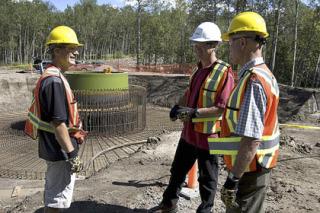

B.C. enters wind energy era
By Tom Fletcher
BC Local News
October 13, 2008
B.C.'s first commercial wind turbine has been erected on a ridge west of Chetwynd, and concrete tower foundations are nearing completion at another project site outside Dawson Creek.
 From left: Dawson Creek mayor Calvin Kruk, AltaGas vice-president Jim Bracken and Steve Rison, president of the Peace Energy Cooperative, visit a wind turbine foundation on Bear Mountain that is ready for concrete.
Don Pettit, Peace PhotoGraphics
From left: Dawson Creek mayor Calvin Kruk, AltaGas vice-president Jim Bracken and Steve Rison, president of the Peace Energy Cooperative, visit a wind turbine foundation on Bear Mountain that is ready for concrete.
Don Pettit, Peace PhotoGraphics |
It's B.C.'s debut as a wind energy producer, long after other provinces have begun harnessing wind to help light homes and industry. The Dokie Wind Project near Chetwynd aims to be first to produce power from seven turbines early next year, with 48 huge windmills spinning by the end of 2009 and phase two to follow at a nearby site.
Bear Mountain Wind near Dawson Creek is on time and on budget for completion of its 34-tower wind farm next November, says its president, Jim Bracken. He acknowledges that the Dokie project may have "bragging rights" for the first producing turbine, but both should be at their full 100 megawatt capacity around the same time next year. Each will provide enough power for 30,000 or more average homes.
Despite B.C.'s reputation as clean, green and nuclear free, there are already dozens of wind farms in the Maritimes, Quebec, Ontario, across the prairies to Alberta and even one in Yukon. It wasn't until the B.C. government required BC Hydro to reach self-sufficiency with new clean energy from independent sources that investors turned to this province.
"I think perhaps it was just a matter of independent power projects generally being later to come on in British Columbia than in other areas," Bracken said in an interview. "Wind projects tend to be developed by independent power producers as opposed to the utilities themselves."
Bear Mountain was conceived by a local cooperative in Dawson Creek. It's now 100 per cent owned by Calgary-based AltaGas Income Trust, which is diversifying its natural gas production with power projects, including B.C. run-of-river and its first wind farm.
The Canadian Wind Energy Association is hosting its annual conference in Vancouver Oct. 19-22. David Huggill, CanWEA policy manager for Western Canada, says there are several factors making wind a better investment in B.C. One is a recognition that wind and hydro work well together, with utilities able to hold back water when the wind is blowing.
Another is that the best hydro sites are now being developed, and both their construction cost and environmental impact are better recognized.
Once it has an environmental certificate to proceed, "a wind farm can be on the ground and generating power to the grid within two years," Huggill said. "I think you'd be hard pressed to find a hydro project that could match that kind of time frame."
Wind generally costs more to build per megawatt, and CanWEA will release a strategy document at the conference calling for a monetary value to be placed on its smaller ecological footprint. On the horizon is another incentive, wind projects as a carbon offset for energy companies such as AltaGas.
"That is really what I affectionately refer to as icing on the cake," Huggill said.
Bracken said AltaGas expects to gain revenues from offsetting greenhouse gas emissions, but until a carbon market evolves in Canada, projects like Bear Mountain have to stand on their own.
B.C. Energy Minister Richard Neufeld said BC Hydro's latest call for clean power produced bids that averaged around $75 a megawatt hour, with wind on the high side compared to run of river. Tidal and wave generation, by comparison, is estimated to cost $250 to $400.
"It wasn't that long ago the NDP was criticizing us for not having wind energy in the province," said Neufeld, who has been trading political shots with the opposition over its proposed moratorium on private power projects.
NDP leader Carole James said recently she would support some private projects if aboriginal communities share the profits with investors, but in general BC Hydro should develop and own the province's power assets.
bclocalnews.com
Posted by Arthur Caldicott on 14 Oct 2008